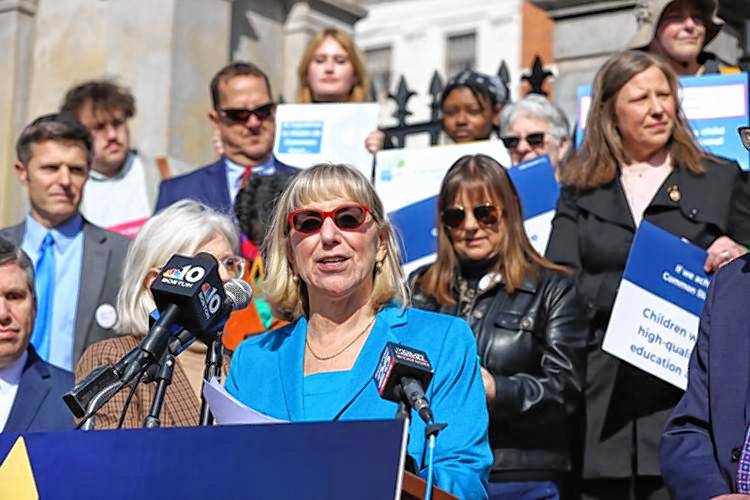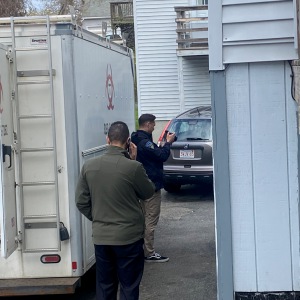Senate tries again on early ed bill aimed at helping more Massachusetts families

Senate President Karen Spilka speaks at a rally before the Senate takes up an early childhood education investment bill last Thursday. STATE HOUSE NEWS SERVICE/SAM DRYSDALE
| Published: 03-17-2024 3:01 PM |
BOSTON — More Massachusetts families would become eligible for subsidized child care and “transformational” grants that kept the early education system afloat during the pandemic under a bill the Senate unanimously passed late last week.
It’s the second time the chamber has passed a bill of this type in three years, but Senate President Karen Spilka said Thursday that she brought the latest bill (S 2697) up for a vote earlier in the session this time around to give it a better chance of getting Gov. Maura Healey’s signature by the end of the formal lawmaking session in July.
In 2022, the House did not take up a similar bill the Senate brought forward about three weeks before formal sessions ended.
Democrats have firm control over both branches and while they often seek to differentiate themselves from the partisan fighting that’s common in Washington, they have often struggled to use their political power to rally around a unified agenda.
Asked if she had been in communication with House Speaker Ron Mariano about whether he planned to bring early education reform to the floor of his chamber, Spilka did not directly respond.
“I speak to the speaker a lot, but I’m hoping they take this up. Because it’s critically important for our commonwealth, our kids, our families,” Spilka said.
Pressed by reporters if she had heard anything about the House taking up the bill, Spilka replied, “I’m hoping the House takes it up. This is a very important bill.”
Though representatives haven’t taken action yet on early education and care, Mariano indicated last year that the struggling sector would be among his priorities this legislative session.
Article continues after...
Yesterday's Most Read Articles
 Police report details grisly crime scene in Greenfield
Police report details grisly crime scene in Greenfield
 Authorities ID victim in Greenfield slaying
Authorities ID victim in Greenfield slaying
 State records show Northfield EMS chief’s paramedic license suspended over failure to transport infant
State records show Northfield EMS chief’s paramedic license suspended over failure to transport infant
 New buyer of Bernardston’s Windmill Motel looks to resell it, attorney says
New buyer of Bernardston’s Windmill Motel looks to resell it, attorney says
 On The Ridge with Joe Judd: What time should you turkey hunt?
On The Ridge with Joe Judd: What time should you turkey hunt?
 Ethics Commission raps former Leyden police chief, captain for conflict of interest violations
Ethics Commission raps former Leyden police chief, captain for conflict of interest violations
“This session, the full attention of the House will be directed at examining ways to further support our vital early education and care workforce,” Mariano said during his inaugural speech. “This workforce is made up largely of women and often women of color. As we work to build a system to provide affordable access to quality child care for Massachusetts families, I was proud of the work done last session to increase salaries and other key supports for EEC workers, and I’m confident that the Legislature can do more on this critical issue.”
The bill aims to make permanent high-cost state grants for early education and care providers, increase the income threshold to make more families eligible for child care subsidies, and establish recommended salary and benefit guidelines for early childhood teachers commensurate with K-12 public school teachers.
Minority Leader Bruce Tarr, a Gloucester Republican, said during Thursday’s session that the bill would come with a “very substantial” bottom line and encouraged colleagues to consider “things that we can afford and that we can sustain.”
“And I am concerned. We do need to act. But I am very concerned about the cost of the bill, and how we will support the cost of the bill, lest we make a promise that can’t be fulfilled in the legislation that we consider here today,” Tarr said.
Sen. Jason Lewis, co-chair of the Joint Education Committee, said implementation of the bill would “require substantial additional investments.”
Addressing “those who may express skepticism about the feasibility or the wisdom of such investments,” Lewis referred to a 2022 Massachusetts Taxpayers Foundation report, which he said “found that the current broken early education and care system in Massachusetts is costing us billions of dollars.”
“Specifically, individuals and families lose $1.7 billion annually in lost wages. Employers lose $800 million annually in lost productivity and high turnover costs. And we in state government lose $200 million annually in foregone tax revenues. So very clearly, the current system, the status quo, is already costing us a lot of money,” the Winchester Democrat said.
The Senate president’s office noted there is $1.5 billion already dedicated to early education and care in this year’s state budget, and costs “will be subject to additional appropriations in future fiscal years.”
Current law limits subsidies to households whose incomes equal up to 50% of the state median income, or $73,000. The bill would raise the eligibility threshold to 85% of the state median income, which is $124,000 for a family of four.
With the caveat that it is “subject to available funding” the bill also calls for the eligibility threshold to rise further to 125% of state median income, or $182,000 for a household of four.
It would make permanent Commonwealth Cares for Children (C3) grants, a driver of recent in-state spending growth in early childhood education.
The C3 grants were funded at $475 million in fiscal year 2024, and the governor is recommending another $475 million infusion of the grant money next fiscal year, though she’s having to find more creative ways to cover that as tax collections trail off.
The bill directs the Department of Early Education and Care to develop a “career ladder” for early educators that establishes recommended salary and benefit guidelines commensurate with public school teachers. It also seeks to establish a competitive grant program to encourage employers to set up new early education and care centers, with preference given to lower-income families and child care deserts, and require the Department of Higher Education to permanently administer existing scholarship and loan forgiveness programs.
A Tarr amendment to create a tax credit for companies who provide employer-supported early education and care benefits to employees was rejected 7-32. Sens. Michael Barrett, Nick Collins and Marc Pacheco joined the Republican caucus of Sens. Peter Durant, Ryan Fattman, Patrick O’Connor and Tarr to support the new tax credit.
“It’s time that we get to work and solve this problem,” Spilka said during a pre-session rally outside the State House. “Stop talking about it and actually solve it and empower every single young person with the advantages that come with getting ... quality early education. This is a children’s issue. This is a woman’s issue. This is a family issue. I would say this is a man’s issue as well. This is a racial equity issue. It’s an economic issue. This is an issue for Massachusetts.”

 What are the protocols for emergency transport of infants?
What are the protocols for emergency transport of infants? Frontier Regional School students appeal to lower voting age
Frontier Regional School students appeal to lower voting age
